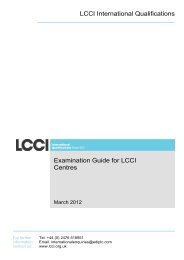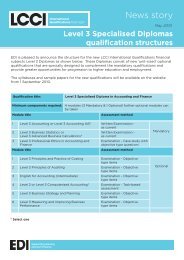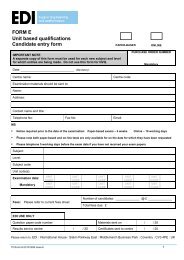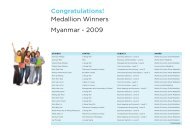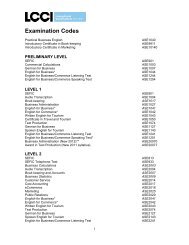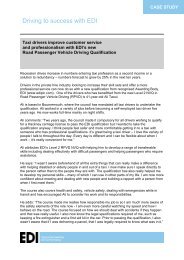LCCI International Qualifications Examination Guide for LCCI Centres
LCCI International Qualifications Examination Guide for LCCI Centres
LCCI International Qualifications Examination Guide for LCCI Centres
Create successful ePaper yourself
Turn your PDF publications into a flip-book with our unique Google optimized e-Paper software.
9 Particular assessment requirementsEvery EDI centre has a responsibility to ensure that all its candidates are able to reach their full potential.When candidates have• physical, sensory or mental impairments• emotional behavioural problems• temporary disability or sudden onset of a condition/circumstance requiring special considerationreasonable adjustments frequently have to be made so that they are given every opportunity to achieve.Adjustments to assessments• should not invalidate the assessment requirements of the qualification• should reflect the candidate’s normal way of working• should be based on the individual need of the candidate.Definition and proof of disabilityCandidates are deemed to have a permanent physical, sensory or mental impairment if they can prove thatthey have had the particular condition <strong>for</strong> a period of at least a year. Examples of the proof requiredinclude medical reports from doctors, psychiatrists, educational psychologists, specialist teachers, fundingagencies etc. Where medical reports may not be available, EDI will expect to see documentary evidencethat the candidate’s particular assessment requirements have been identified during initial assessment andaccommodated throughout the programme of work.Once a candidate has been proved to have a particular physical, sensory or mental impairment, reasonableadjustments may continue to be made even if there is improvement or remission in the identified disability.Temporary disabilityCandidates who have a physical, sensory or mental impairment that is under one year’s duration, aredeemed to have a temporary disability and centres need to be sure that reasonable adjustments really arenecessary. For example, reasonable adjustments might not need to be made if the candidate is sitting atest that is available on demand or at monthly intervals. Examples of temporary disability would includebroken limbs, sickness or hospitalisation where it might be necessary <strong>for</strong> candidates to sit examinations orassessments in hospital or their own homes. Approval should be sought from EDI on these occasions.Special considerationSpecial consideration is given to disadvantaged candidates in instances that could not possibly bepredicted. This ensures that candidates who suffer temporary illness, injury or indisposition at the time ofindependent/external assessment are treated fairly.Candidates who are present <strong>for</strong> the assessment but disadvantaged:A note should be made on the supervision report attached to the examination papers or assessmentmaterial. This report then goes <strong>for</strong>ward with the candidates’ scripts or answer books and EDI will make theappropriate allowance, in accordance with agreed criteria.For on-screen tests, the Invigilator Declaration and Attendance Report should be submitted to EDI withdetails of special consideration.<strong>Examination</strong> <strong>Guide</strong> <strong>for</strong> <strong>LCCI</strong> <strong>Centres</strong> July 2008 17




